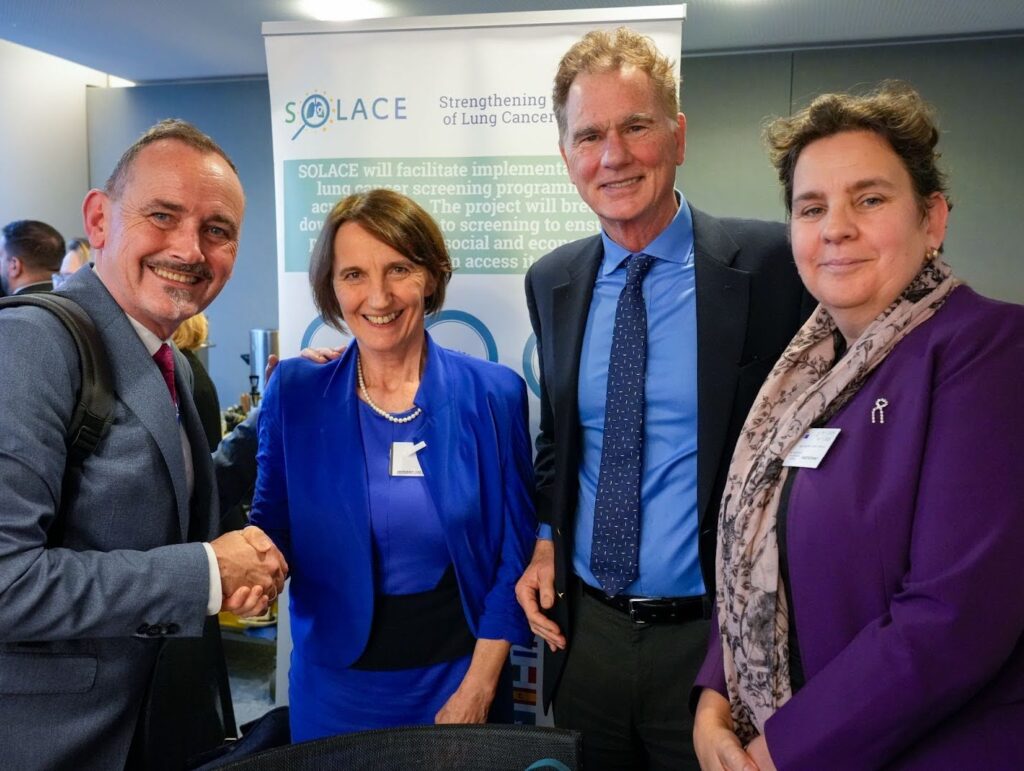
Exploring the EU’s success in lung cancer screening at the European Parliament
The future of lung cancer screening across Europe took centre stage at the European Parliament on 18 November, as MEP Nikos Papandreou hosted discussions on turning EU-funded research into life-saving practice.
Organised by the European Respiratory Society (ERS), European Lung Foundation (ELF) and European Society of Radiology (ESR), the event brought together health experts, screening participants, patient advocates and policymakers to explore how projects like SOLACE are supporting Member States to build effective, equitable screening programmes. Here are the highlights:
1. MEP Papandreou sets the vision for EU-wide screening
Opening the session, MEP Nikos Papandreou emphasised the historic progress made since the EU included lung cancer screening in its Council Recommendations for the first time in 2022.
“For the first time, Europe has a clear pathway to make lung cancer screening a reality across all Member States. EU investment, scientific leadership and projects like SOLACE have brought us to this point. Our task now is to turn progress into practice—ensuring that early detection, quality care and equitable access become the norm for every European citizen,” said MEP Papandreou, who chaired the discussion alongside Prof Ildikó Horváth.
MEP Papandreou highlighted how EU funding is now enabling pilot projects across Member States, testing how screening can work effectively and fairly in real-world settings.

MEP Nikos Papandreou and Prof Ildikó Horváth
2. Experts showcase equity-focused approach
Prof Torsten Blum outlined how the SOLACE project is putting equity at the heart of screening delivery, ensuring that early detection reaches underserved communities. Prof Marie-Pierre Revel demonstrated radiology’s vital role in making screening programmes both effective and accessible.
The voices of people at risk and those who have participated in the screening process were central to the discussion, with Angeliki Paraskevopoulou-Souri from LuCE and Pippa Powell from the European Lung Foundation presenting perspectives on what screening pathways should look like from their experience. They introduced a new SOLACE screening video, highlighting real stories from those who have benefited from early detection.

Clockwise from top left: Prof Torsten Blum, Prof Marie-Pierre Revel, Pippa Powell, Angeliki Paraskevopoulou-Souri
3. EU guidelines point the way forward
Dr Ciaran Nicholl from the European Commission’s Joint Research Centre provided insights into the development of upcoming EU guidelines on lung cancer screening.
“We are working on six of the big cancer killers, and the lung cancer guidelines are now one of the latest ones. The call for experts took place last summer; over 150 experts applied, and there are studies now going on to look at the settings in Europe and on the guidelines design.
“There will be meetings for the experts set up in early 2026, so by the summer of 2026, we should be at full speed ahead for the working group. Experts will be working together with patients and patient advocates on developing evidence-based guidelines,” said Dr Nicholl.
The guidelines will provide a crucial framework for Member States looking to implement or scale up their screening programmes.

Dr Ciaran Nicholl, European Commission, Joint Research Centre
4. Countries share real-world experiences
The event featured compelling examples of screening implementation across Europe. Prof Ildikó Horváth presented insights from targeted screening pilots in three countries, while Prof Janusz Milanowski and Dr Michał Szczyrek showcased innovative mobile screening approaches reaching underserved communities in Poland.
These country case studies demonstrated both the potential impact and practical challenges of rolling out lung cancer screening across diverse healthcare systems and populations.

Prof Janusz Milanowski and Dr Michał Szczyrek present SOLACE data from Poland
5. Policy roadmap for sustainable implementation
The final session focused on ensuring long-term success. Dr Anna Kerpel-Fronius presented comprehensive policy recommendations from the SOLACE project, while Prof Rozemarijn Vliegenthart and Prof Torsten Blum outlined the vision for SOLACE 2 – expanding successful screening approaches across all EU Member States.

Dr Anna Kerpel-Fronius and Prof Rozemarijn Vliegenthart
MEP Papandreou concluded with a call for continued collaboration between EU institutions, healthcare professionals and patient communities to make lung cancer screening a reality for all Europeans who need it.

